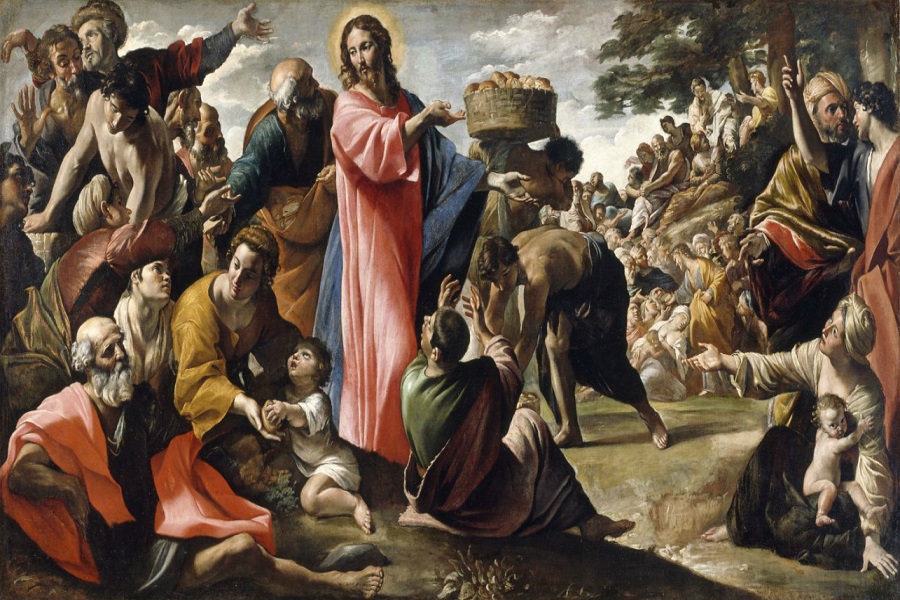
The Multiplication of Bread
07-25-2021Weekly ReflectionFr. Bing ColasitoOne of the most outstanding miracles of the prophet Elisha was the multiplication of loaves. A man brings food to the prophet and he says: bring this food to the people so they can eat — the exact number was twenty barley loaves. Elisha knows that it would not be enough, but he insists on distributing them to the people; not only will it be sufficient, but there will be some leftovers. Some of his disciples objected saying, that they would not be enough. Elisha knew that God is on his side and insists on distributing them because not only will it be sufficient, but there will be leftovers.
The miracle of multiplication appears in all the Gospels, but scholars agree that it only happened once. The Gospels of Matthews and Mark left the two traditions stand side by side: Mk. 6:30-44 presents Jesus as the Good Shepherd who feeds the people by His words and the miraculously multiplied loaves. Since the multiplication prefigured the Holy Eucharist as food, one has to received it more often. When we receive the Eucharist often, we grow.
The account of John of the multiplication differs from the Synoptics, which contains more details. The five (5) details of the Miracle of the Multiplication point to five Eucharistic overtones. The same five points in the consecration formula of the Mass Canon. 1.) Jesus took the bread 2.) He looked up into heaven, 3.) He gave thanks or spoke the blessings, 4.) Broke the Bread (missing in John), 5.) He gave it to His disciples. Despite one missing element in John, His account foreshadows more the Holy Eucharist — contained in the long Eucharistic discourse in Jn. 25-71.
Three Lessons we can learn from this Gospel:
- The people are hungry both for material and spiritual food. The crowds have been following Jesus and His disciples wherever they went because they see in Jesus someone who can nourish their body and soul.
- The seemingly impossible situation of feeding the crowds moved a little boy to offer his provisions. It takes a small act of faith to bring the miracle of multiplication. As St. Mother Theresa says: Just a drop in the ocean — but the act of faith saved the day. It is better to light one little candle than to curse the darkness of the situation. The boy provided a ray of hope amid helplessness and despair.
- God multiplies the little that we surrender to Him into abundance when it passes the hands of Jesus. Jesus takes the little we offer, blesses it, and gives it back to the people. God did not allow the people of Israel to die in hunger in the desert. He will continue to feed His people through His Son. Thus, in the Gospel, Jesus satisfies their hunger and nourishes them beyond their needs.
None of us can ever duplicate the miracle of the multiplication of the loaves and the fish that feeds five thousand. The Miracles of Jesus are signs that point to a deeper reality of who He is and how much He cares for the people. The people are amazed at the signs and wonders — they focused on the Miracle of the Multiplication while forgetting the more essential activities of Jesus’ love and concern for the poor and the hungry. In the same way, faith is not so much about the multiplication of prayers and devotions, but about the imitation of loving care and compassionate heart of Jesus. Is my heart striving to imitate the Sacred Heart of Jesus?
In our parish, we promote the devotion to the Alliance of the Two Hearts, the Sacred Heart of Jesus, and the Immaculate Heart of Mary. May our devotion to His Sacred Heart lead us to the virtue of humility and sincerely imitate the Heart of God the Father. Spiritual Fathers say: Humility is the cardinal virtue on which all the other virtues are hinged. No one can duplicate the power, wisdom, or intelligence of God, but we can always imitate the way Jesus cares and loves His people with a humble heart.
BACK TO LIST